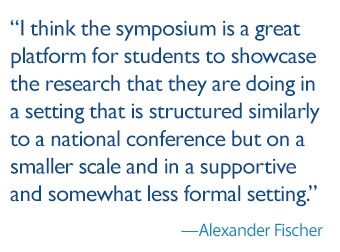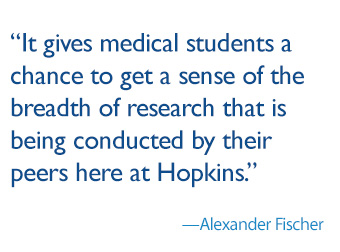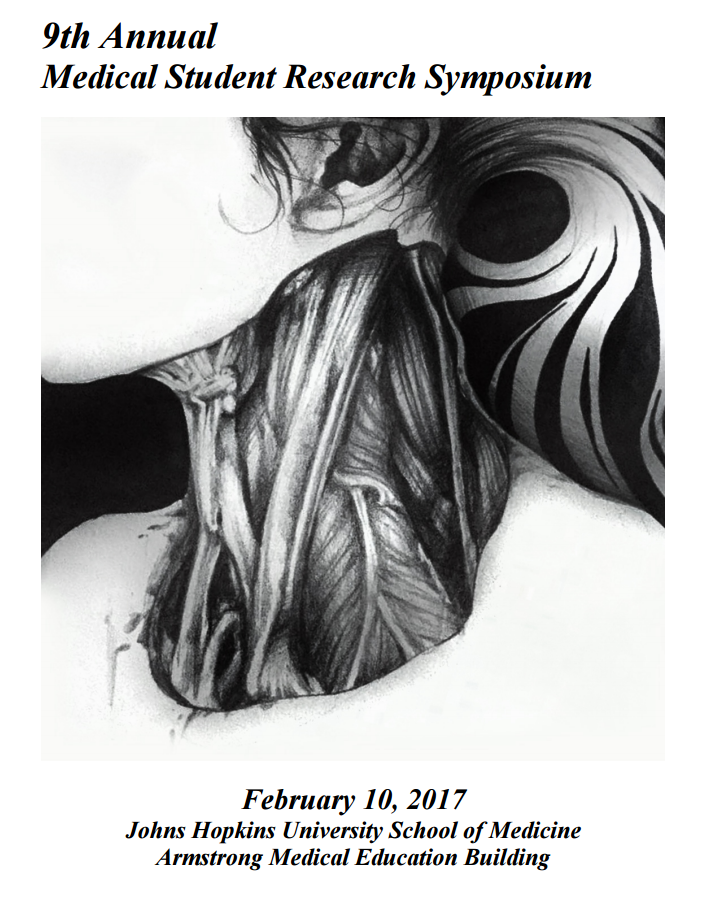On Feb. 10, the Johns Hopkins University School of Medicine held its ninth annual Medical Student Research Symposium. The symposium, which coincides with the culmination of the Scholarly Concentration program that takes place during the first and second years of medical school, is an opportunity for Johns Hopkins medical students to showcase and exchange ideas about their research with their friends, faculty members and mentors. Aside from the traditional poster presentations, students are selected to present their research in oral presentations.
Sharing Research Outside the Lab
Traditionally, students have submitted research under a variety of categories, including but not limited to basic science, clinical science and the history of medicine. For some individuals, this experience was formative and influential throughout their years in medical school. Alexander Fischer, one fourth-year medical student who helped organize the event, observed: “Working on research at Hopkins has been one of the most rewarding aspects of my medical experience, so this is my way of giving back. I think the symposium is a great platform for students to showcase the research that they are doing in a setting that is structured similarly to a national conference but on a smaller scale and in a supportive and somewhat less formal setting.”
 Fischer also noted that that the symposium has the potential to influence all students, not just those who choose to submit their work. “It gives medical students a chance to get a sense of the breadth of research that is being conducted by their peers here at Hopkins. It gives the first-year medical students a chance to become inspired about the research that they will be conducting during their time during the scholarly concentration.”
Fischer also noted that that the symposium has the potential to influence all students, not just those who choose to submit their work. “It gives medical students a chance to get a sense of the breadth of research that is being conducted by their peers here at Hopkins. It gives the first-year medical students a chance to become inspired about the research that they will be conducting during their time during the scholarly concentration.”
And the Winners are...
This year, the podium presentations ranged from clinical research focusing on antibiotic efficacy to the emergence of multidisciplinary pain clinics across the United States. Ultimately, three students walked home with prizes, being commended for both exceptional research and presentation skills: Anna Goddu, for her talk titled “Words Matter: Using Stigmatizing Language in Patient Charts Negatively Impacts Physician Attitudes and Dosing of Pain Medication”; Andrea Yonge, who presented “Circumstances, Locations, and Outcomes of Falls in Patients with Glaucoma”; and Victoria Huang, who discussed her work “New Regulatory T Cell Targets in Prostate Cancer.”
 Aside from the large-scale podium presentations, several of the small-scale presenters were also recognized for their excellence in research, including Carson Woodbury, for his talk titled “Sexual Well-Being After Breast Cancer Surgery and Breast Reconstruction: A Systematic Review with Meta-Analysis,” and Jia Ahmad, for her presentation titled “The Emergence of an Epidemic: NIDA, Heroin, and the Birth of “Drug Abuse Epidemiology.” These projects, among the other speakers and nearly 100 posters on display, highlight the variety of research types, topics and the diverse interests of the students and faculty at Johns Hopkins.
Aside from the large-scale podium presentations, several of the small-scale presenters were also recognized for their excellence in research, including Carson Woodbury, for his talk titled “Sexual Well-Being After Breast Cancer Surgery and Breast Reconstruction: A Systematic Review with Meta-Analysis,” and Jia Ahmad, for her presentation titled “The Emergence of an Epidemic: NIDA, Heroin, and the Birth of “Drug Abuse Epidemiology.” These projects, among the other speakers and nearly 100 posters on display, highlight the variety of research types, topics and the diverse interests of the students and faculty at Johns Hopkins.
Thanks to the Mentors
While these budding researchers displayed hard work and initiative, credit also needs to be given to the many mentors who helped with research and organized the symposium, including Dr. Mary Catherine Beach, Ms. Carly Wasserman and numerous scholarly concentration advisors. Without the supportive faculty members and mentorship at Johns Hopkins, such remarkable breadth and quality in student research would be much more difficult to achieve.
Related Content
- Postdoc Retreat Features Johns Hopkins Research, Professional Development
- Partnering Toward Discovery Seminar Series: HIV-Positive to HIV-Positive Transplants
- Learn more about what one student calls "magical mentorship".
